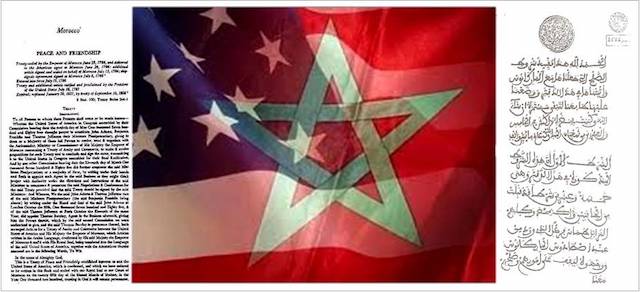Updated
The Skill of the Moroccan Monarchy in International Relations with the United States – Ambassador Edward M. Gabriel (ret.)

Morocco-US ‘Treaty of Peace & Friendship’ ratified by the US Congress in 1787
Ambassador Edward M. Gabriel (ret.)
September 19, 2019
 The continuing progress in US-Moroccan relations, dating from Sultan Mohammed III to King Mohammed VI, serves to underscore the continuity and diplomatic skill of the Moroccan Monarchy in its long history with the United States.
The continuing progress in US-Moroccan relations, dating from Sultan Mohammed III to King Mohammed VI, serves to underscore the continuity and diplomatic skill of the Moroccan Monarchy in its long history with the United States.
It is widely known that Morocco was the first country to recognize the United States of America in 1777, under Moroccan Sultan Mohammed III. This was followed by the US-Morocco Treaty of Peace and Friendship, negotiated by Thomas Barclay and signed by American diplomats and future US presidents John Adams and Thomas Jefferson in 1786.
During his 33-year reign, Sultan Mohammed III transformed the politics, economy, and international trade of the sultanate of Morocco, restoring its power after a long period of instability and war, and aligning its interests with those of the United States.
Sultan Yazid followed in his father’s footsteps by re-enforcing the importance of the treaty despite threats by the Barbary pirates. That treaty remains today as the longest existing US accord with a foreign country.
The United States’ only National Historic Landmark in a foreign country is located in Tangier, Morocco on a site offered by Sultan Moulay Suleiman in 1821to serve as the US consulate. This was yet another sign of Morocco’s early efforts to build close relations. The building is currently the home of the Tangier American LegationInstitute for Moroccan Studies (T.A.L.I.M.).
In one of the more colorful episodes of the Legation’s history, US Consul General Thomas Carr reported that, in 1839, Sultan Abd al-Rahman gifted him two lions and a horse. This was higher than the gift allowance permitted by the United States government, and adversely affected the budget of the Consul due to the food needed for the animals! This and other continuing gestures of friendship by the Sultans of Morocco towards the US continued through the reign of 13 monarchs.
It should also be noted that Morocco served alongside US and Allied forces in North Africa, Italy, and France in WWI and WWII, and, since gaining its independence in 1956, Morocco has always sided with the US against the Soviet threat.
My article is inspired by a passage in A History of Modern Moroccoby Susan Gilson Miller in which she describes recent events in Morocco’s history, and which brings to mind an important meeting I had with King Hassan II in 1998.
Miller points out how King Hassan II drew back from the non-aligned movement his father Mohammed V had “mapped out” and “veered sharply to the West…a foreign policy designed to reflect his long-standing desire to firmly establish himself as an ally of the West.” She goes on to say that “US-Morocco strategic cooperation became less important once the Cold War ended, but Morocco was still seen by many US lawmakers as a ‘bulwark’ of stability in an otherwise volatile area.”
When I was US Ambassador to Morocco, and before he passed away in 1999, King Hassan and I had several private meetings and, among many topics, discussed Morocco’s role in the post-Cold War order and, in particular, its value to US relations in the future.
We talked about what would become of the US-Algerian relationship in a post-Cold War period, and concluded that it would take 5-10 years before Algeria-US relations could compete with those of Morocco (a relationship which would unfortunately not gain much headway to this day). This would give Morocco significant time to re-evaluate and implement a North African and regional policy with the US.
I emphasized that the King’s standing in the Arab world continued to give Morocco a privileged position regarding its relations with Israel, a country with which he continued to have an open and frank dialogue on regional matters. The US saw this as vitally important to its quest for peace between Israel and Palestine. The King reiterated that the strong relationship and cooperation between our two militaries and intelligence agencies, which had a long history dating back to the founding of the United States, is never to be questioned.
During that meeting, we mainly focused on the recent parliamentary elections. For the first time, a party in the opposition – the USFP headed by Abderrahmane Youssoufi – won the election, forming the first government of Alternance, a step that gained the attention of the US and provided an ideal opportunity to advance our mutual goals of establishing democratic principles in the region.
King Hassan discussed his strong desire for and an obvious focus on the importance of a speedy process to create a strategic relationship with the Alternance government, with the goal of advancing a democratic, prosperous, and stable Morocco. He saw this as being in the mutual interest of both countries.
That meeting was the beginning of a strategic dialogue between the US and Moroccan governments to support programs and policies that advanced political reforms, decentralization, economic opportunity and growth, and military cooperation.
Following the death of King Hassan II, King Mohammed VI would put this process into high gear, announcing a year later an official strategic partnership involving political, social, and economic programs supported by the US, as well as a new military alliance, the Defense Cooperation Council (DCC). He would initiate a dialogue with NATO, making Morocco a Non-NATO ally, and having it participate with the US in several significant anti-terrorism coalitions. In 2004, Morocco would also sign a rare US free trade agreement.
With economic reform would come increased trade between our two countries, which would triple in the next few years. The achievements of the past twenty years, during King Mohammed’s reign, are impressive, consolidating economic and political progress, while advancing the civil rights of its citizens. The King has said there is more work to do, but today Morocco serves as an example of reform and change in the Middle East and North Africa.
Moroccan kings have thus played an important role in significant international events during the past two hundred years, and have been dependable friends of the United States. Morocco’s military, security, and political standing in the region play an important role in support of US interests, and, more recently, it has demonstrated that it shares many of the same valuesin advancing democratic and economic openness in the region. This is the kind of friend that has proven itself, and can be counted on in the twenty-first century.